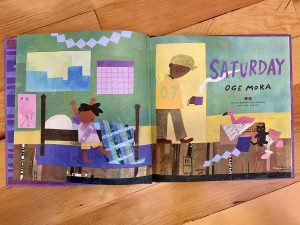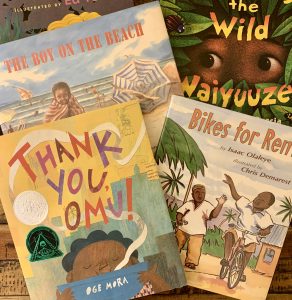As a parent, you are your child’s first teacher. If you’re a white mom, like me, it’s easy to fear that you’re doing Black History Month wrong and to leave it to the real teachers to do the teaching. You know, wait until they are in preschool or kindergarten, and let a wise teacher with a master’s degree teach about Rosa Parks and Reverend Martin Luther King, Jr. You know they’ll use the right words that are developmentally appropriate and do it justice.
Well, I’m here to say that kind of approach doesn’t serve any of us.
If there’s anything I’ve learned, and I think I’m in good company here, we need to talk with our kids about race and Black history starting at the youngest age. It’s also ok to focus on Black joy. Here are a few things we’re sharing this month at the clinic to help you get started.
Books for preschool and school-age kids
There’s no easier way to start a conversation than by reading a great book together. Not sure where to start? Try Antiracist Baby by Dr. Kendi. I personally learned so much from How to be an Antiracist, which I highly recommend. I was introduced to the inspiring author and his books via Brene Brown’s Unlocking Us podcast featuring Dr. Kendi.
Looking for picture books? Laura and Sarah are spotlighting the books of award-winning Black author and illustrator Oge Mora, including Saturday and Thank You, Omu!, in their speech therapy sessions this month. Both books celebrate the small joys of Black families sharing food, connecting in their communities, and spending joyful time together. If you’re feeling crafty, you can try to make your own art using the beautiful collage techniques that Mora is known for.


Black author and speech-language pathologist Shontae Glover, who runs a pediatric practice in New Jersey as well as the website Having Our Say, shares books she loves to use in therapy during Black History Month and that families can read and enjoy year-round. Her first book, Liam’s First Cut, was published just last year. It’s the story of a Black autistic boy who gets to visit a barbershop for his very first haircut.
Learning with movement
Kid won’t sit still for stories? Dance to the musical movement of Amanda Gorman’s poetry or along with Nia Dennis’ amazing Black excellence gymnastics routine.
Deeper dives for teens and adults
If you have older kids, as I do, tap into the knowledge of Learning for Justice. Start with this article, which encourages teaching complete history and spending time on uplifting stories and not just the trauma.
“Teaching the richness of Black history not only means a more accurate and thorough understanding of slavery and the civil rights movement, but also uplifting stories of liberation, civic engagement, cultural contributions and intersectional identities.”
Many of us are realizing that the American history we learned in school is incomplete. Black history is American history. I hope you’ll join me in being open to relearning it. My key takeaway is that there is so much Black excellence to be found in books, art, music, and unknown history that we don’t want to limit ourselves to learning and celebrating Black history for just this shortest month of the year. Please do share what you’re learning this month and beyond.





